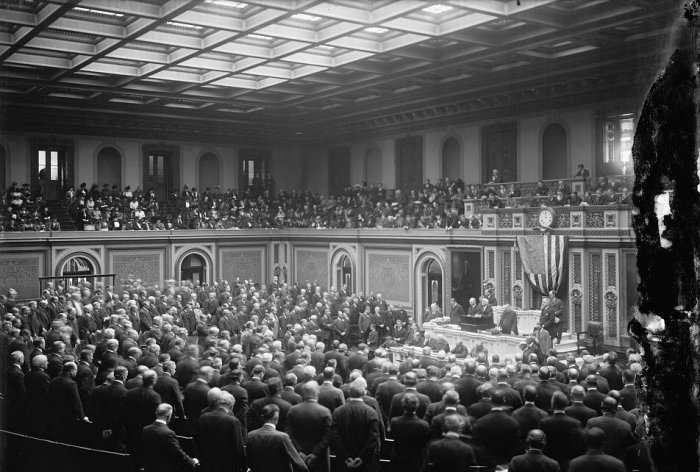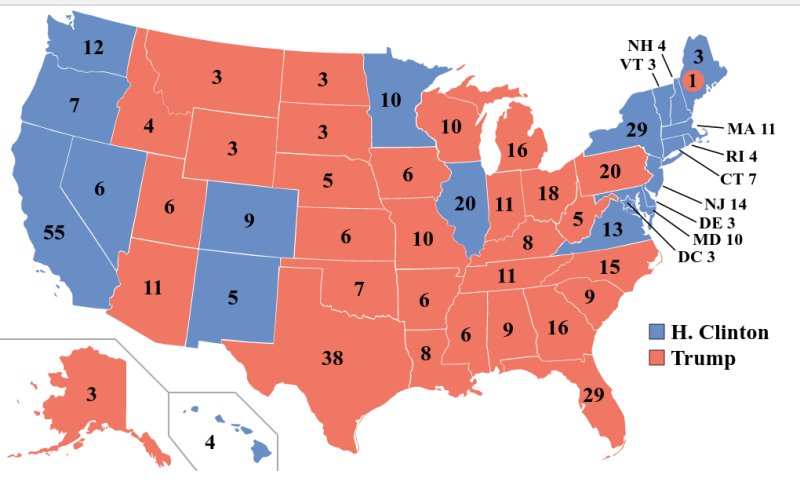It’s hard to visit a news site lately and not come across the topic of the electoral process – a topic that was barely a blip prior to November 8th.
By November 9th, it became the talk of nation and as of this writing, December 15th, it is still being ruminated over, debated and discussed…almost ad nauseum. Opponents decry that the process was created by racists, a privileged group of “primitive” thinking forefathers, and that it’s outdated and unfair. Proponents state that it’s a forward thinking concept, a way to insure that those who live in rural areas and their vote are fairly represented and valued, and a system that promotes fairness to all citizens equally.
Of course, partisanship taints people’s opinions. If, on November 7th we had asked people where they stood on the electoral process, many people wouldn’t have known much about it or had a strong opinion on it either way. There wouldn’t have been these two deeply divided camps, both who became “experts” on the electoral process on the morning of November 9th.
Is it possible to take a balanced look at the electoral process? Is it fair or unfair? Does it need to be overhauled, modernized, kept as is? Is there a better system than the current one? Is it possible to navigate the sea of opinions, stick mostly to facts, and take a more balanced look at the topic?
I believe so.

Preamble….Ramble?
Having said that, I don’t think it is completely possible to be perfectly objective. We all wear a set of goggles, some have more tint than others, but we’re all wearing them. Unless you are a cybernetic organism with a computer for a brain, it’s impossible to completely eliminate our bias. In fact, if someone has to promote how objective they are, there is likely a reason for it – that they, in fact, are not. If you are being completely objective, you don’t need to convince anyone – your words will have their own merit.
So, yes. I have a bias. I can however, say that I will make my best effort to be fair. As someone who is neither a Democrat or a Republican, and a person who finds myself agreeing and disagreeing with stances within both parties, I’d like to think I’m not tainted too deeply. This is a sort of starting point for further discussion and more learning.
But, I happen to think the world is much more complex, most issues are not black and white, and no one should be pigeon-holed so that their entire global beliefs or world views are accurately reflected by either an (R) or a (D).
I don’t paint this picture of myself to toot my horn, but for transparency. So that you can judge for yourself where my biases may lie – pardon the pun.
The Electoral College and Its Purpose
Right now the division is between those who support the Electoral Process, typically Republicans, and those who support the popular vote, typically Democrats. Republicans want to know why the electoral process wasn’t a major issue before the election and feel that if the Democratic candidate, Hillary Clinton had won the electoral college, that Democrats would have shooed any discussion of repealing the electoral college for a popular vote that Trump had won. Democrats say that if most people vote for someone, that person should become president, because what most people want should be the deciding factor – it’s only fair.

Let me try to do that.
The idea behind the electoral process is to insure that heavily populated cities do not determine and make the decisions for the rest of the country, thereby devaluing the power of the rural vote – in essence, punishing them for not living in the city. These cause an imbalance whereby the vote of a city-goer is of increased value and that of someone living in rural areas to decrease in value.
Would we want, let’s say, Boston to decide for the entire state? If we did not have the electoral college, many states with large cities could tell those not living in the city to simply stay home – their vote won’t matter because there aren’t enough people living in the 90% of the rest of the state to defeat what the cities want. We would essentially become a nation of city-states – something that existed in Babylon some 6,000 years ago and died out for a reason.
Furthermore, not only would these cities be deciding for the entire state, a few of the mostly heavily populate states would be deciding for the entire nation. Meaning each election would be decided by a small number of states and the rest of the nation can just stay home and not bother voting.
The election that took place on November 8th was a vote by the citizens to declare who they want to become president – not who is now president. It’s the first of two elections – possibly a third – that declare the next POTUS. The official appointment to declare the next president takes place during another election -by electors- that takes place on December 19th.
The Electors Decide the Next President; America the Republic
Each state has a politician, called an elector. They are people chosen each in the months leading up to November 8th, that pledge that they will cast their vote for the person that their state chose. It’s sort of an honor system, if you will. Important to note that these are not elected officials, but chosen.

Why? What is the point of this “extra” step in the process? On the surface, it seems superfluous – in fact, it’s a safety measure built into the system, like that of the electoral college itself, to prevent tyranny of the majority; to prevent the use of democracy – the popular vote – to overthrow the Republic. Wait, what?
America is, in fact, a Republic, or technically a Constitutional Federal Republic – a nation of states within a Republic. The definition of Republic is a country which is “…organized with a form of government in which power resides in elected individuals representing the citizen body and government leaders exercise power according to the rule of law.” So, while people do vote, –just as in any democracy– the power is in the hands of those we elect to represent us.
Within this Republic, it is the electors who vote for and decide who is the next president, not the “people.”
Vote By Proxy and the Faithless Elector
But here’s the stickler. These electors don’t have to vote according to the way their state voted. There is no law stating that they must vote as the people voted, otherwise the vote on November 8th would simultaneously elect the President. It is assumed that they will serve as proxy for the citizens’ vote – it’s a vote in trust.
If they are within the same political party as the president-elect, why wouldn’t they vote in favor? Well, that aforementioned “…world is much more complex, most issues are not black and white…” is reflected here. This election cycle has been very indicative of this. We all know the stark differences between those who voted for Bernie Sanders and those who voted for Hillary Clinton, even though they are Democrats. And we know even more so, how many Republicans that have disagreed with Trump.
An elector, who will not vote according to the will of the people, is called a “faithless elector.” This is certainly, not the first time in our nation’s history that the faithless electors have had a role. Since the creation of the electoral college, there have been over 150 of them. While they have actually reversed the outcome at the level of the vice-president, they have never changed the outcome of a presidential election.
Is there a way to prevent faithless electors from casting their vote contrary to the November 8th vote by the citizens of their state? No. Is there some sort of repercussion for being faithless electors? Yes, in some states. While the punishment is either so slight as to not be anything remotely resembling a deterrent – possibly a fine – or it likely won’t be enforced, some states, notably in the 2016 elections, Michigan, can void their elector’s contrary vote. It’s worth noting, that there are 14 states who voted for Donald Trump, that can change their vote to Hillary Clinton without any legal penalty whatsoever.

I couldn’t even make a prediction in that area and won’t.
Now, let’s say that for the first time in history faithless electors overturn the the November 8th decision, is it final? No.
If just one House member and one Senator objects to this, a THIRD vote is then undertaken by the House and Senate. They can void the faithless electors’ contrary vote. For this election cycle that means the final decision will be decided by a Republican Majority House and Senate and likely be delegated to Georgia Secretary of State Brian Kemp, Washington Secretary of State Kim Wyman, or Texas Secretary of State Carlos Cascos – all three whom are Republicans.
Finally, there is a last check and balance in the system: in the case of a tie, the House decides the president, while the Senate chooses the vice president.
 New Bedford Guide Your Guide to New Bedford and South Coast, MA
New Bedford Guide Your Guide to New Bedford and South Coast, MA









